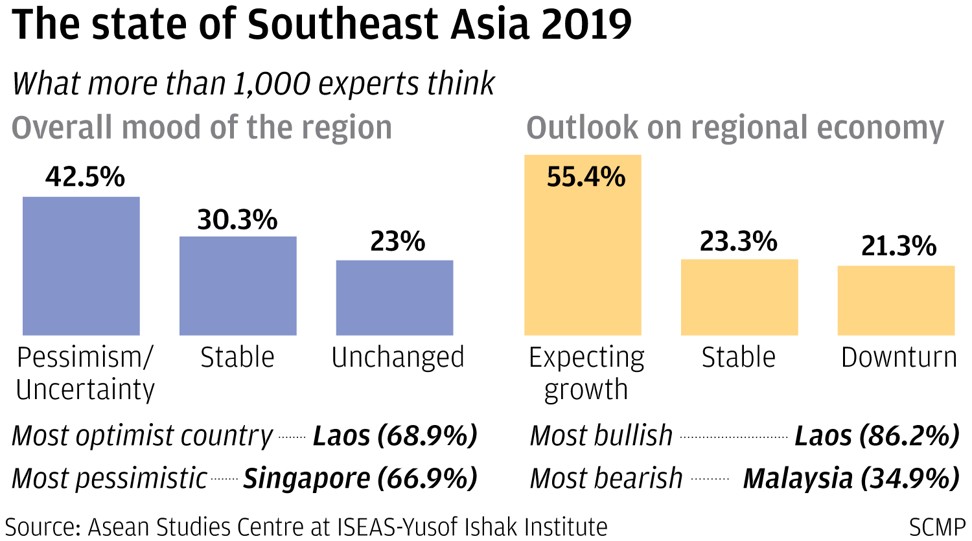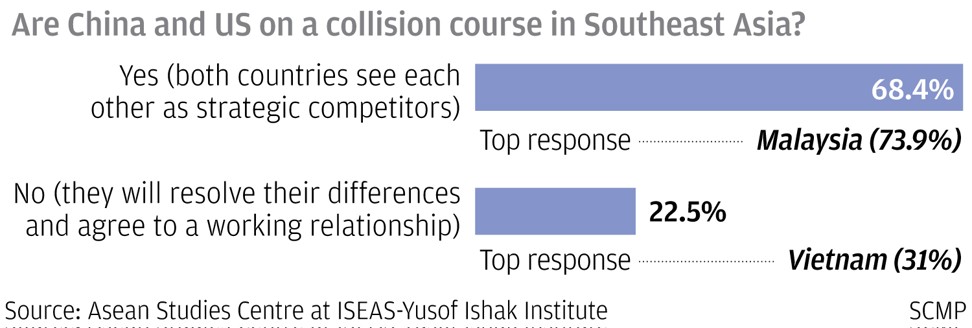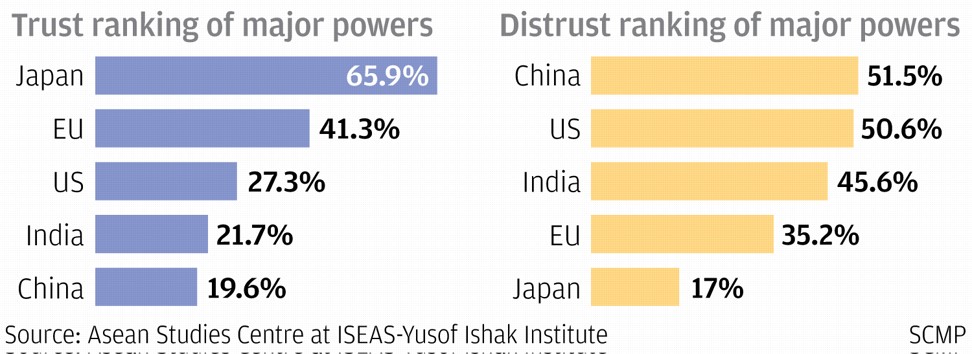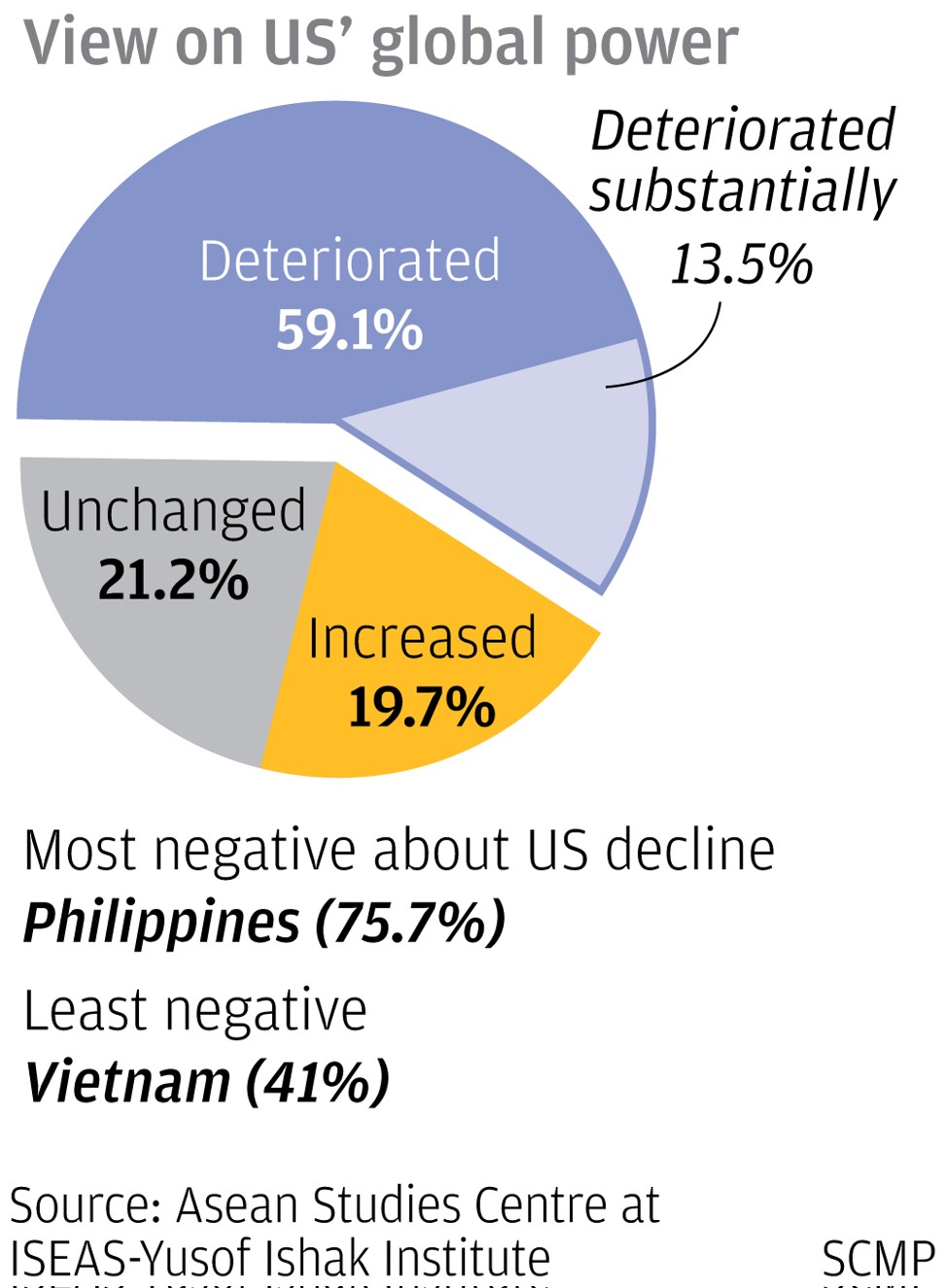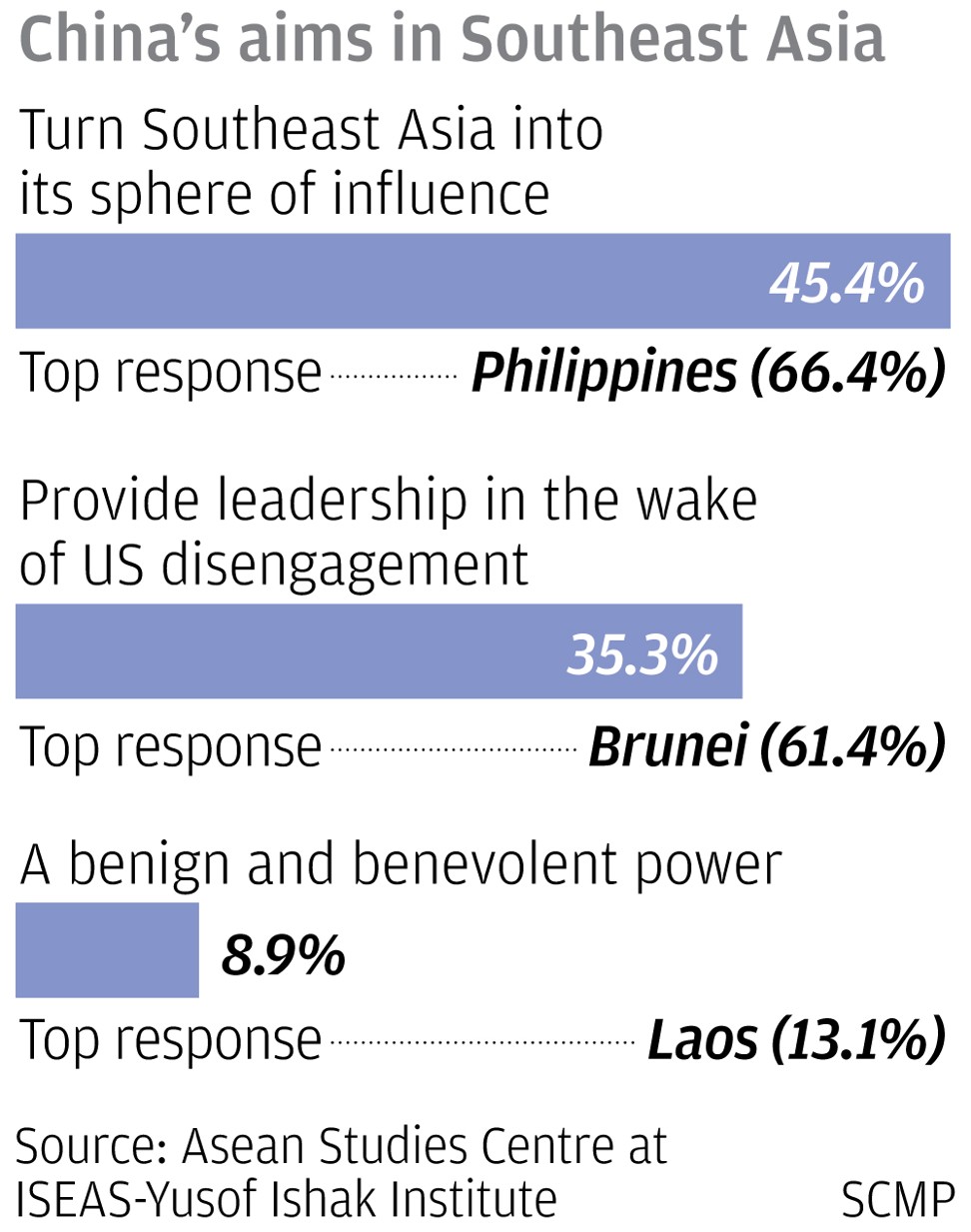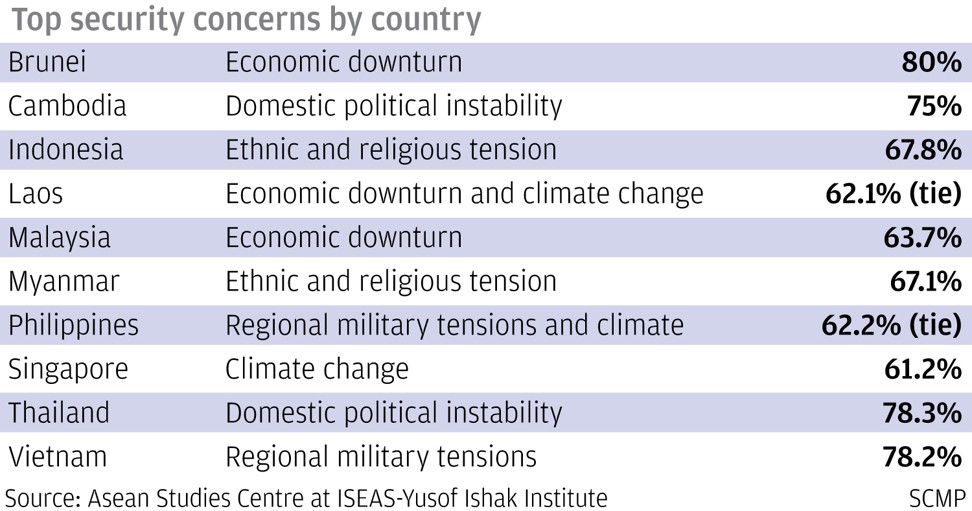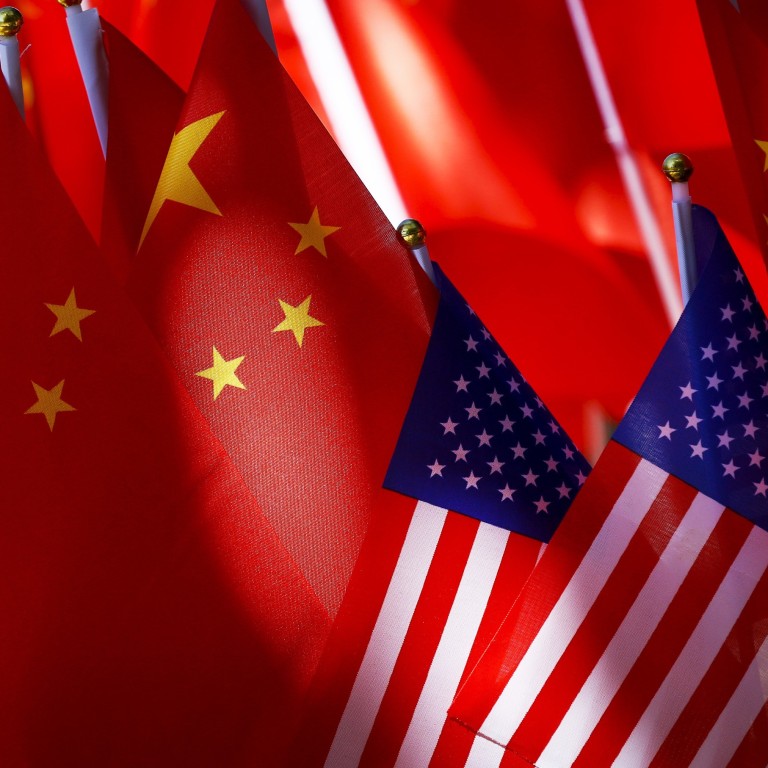
Southeast Asia has major doubts about US reliability in the region, but still wary of China: survey
- More than 68 per cent of those canvassed lack confidence in the US as a ‘strategic partner and provider of regional security’
- But there is also the recognition of Beijing as the unstoppable force it has become, amid an increasing realisation that resistance is futile
A poll of more than 1,000 Southeast Asian experts, analysts and business leaders has laid bare the concerns of a region trying to find its way amid the rise of China and the decline of the United States’ influence.
The State of Southeast Asia: 2019 Report portrays an array of thought leaders who are losing faith in Washington, but still harbour deep concerns about Beijing.
More than 68 per cent of those surveyed doubted the reliability of the US as a “strategic partner and provider of regional security”.
At the same time, the report – authored by the Asean Studies Centre at ISEAS-Yusof Ishak Institute – said only 8.9 per cent viewed China as a “benign and benevolent power”.
Asia in 2019: buckle up for a year of uncertainty and volatility
Of those surveyed, almost 45 per cent said they anticipated an uncertain or turbulent year ahead.
Nearly 70 per cent of respondents said the US and China are on a “collision course” in Southeast Asia, with that opinion most pronounced in Malaysia, Myanmar and Indonesia. Only 22.5 per cent expected the two superpowers to “resolve their differences and agree to a working relationship”.
The State of Southeast Asia: 2019 was an online survey that canvassed the views of regional experts across professional backgrounds.
The report, according to its authors, aimed to present the prevailing attitudes among those “in position to inform or influence policy on regional political, economic and social issues and concerns”.
US ups ante in China rivalry with law to foster Indo-Pacific allies
Almost 60 per cent of those polled said that US power and influence on the global stage has either deteriorated (45.6 per cent) or deteriorated substantially (13.5 per cent), with the highest degree of concern over the US’ decline in the Philippines and Singapore.
For Beijing’s ambitions, more than 45 per cent of respondents said “China will become a revisionist power with an intent to turn Southeast Asia into its sphere of influence”. This was the top response in six Asean states, led by the Philippines and Vietnam.
Friendly panda, fiery dragon: how Asean fell in and out of love with China
Tang Siew Mun, the head of the Asean Studies Centre and an author of the study, said the degree of scepticism about China’s intentions was unexpected.
“Concerns about China’s growing assertiveness have been simmering in the past decade, and are now coming to a boil. The survey reflects that heightened sense of wariness,” Tang told the Post.
“However, we should be careful not to interpret these findings as ‘anti-China’, but as a wake-up call that China’s strong-arm tactics and attempts to mould the region in its image will face considerable pushback.”
Wang Yong, director of the Centre for International Political Economy at Peking University, describes this process as a transition of power in the region. As such, he advises caution.
China ‘on track to meet American military challenge’ in Indo-Pacific
“China is a rising power, and as the neighbouring region, Asean has started to feel its influence,” Wang told the Post. “Different from the US, Japan and the European Union, China is geographically close to Southeast Asia, so it is a natural thing that the region doesn’t put confidence on China.
“This fits the old saying: ‘Make friends with distant countries and attack the nearest ones.’ China must face up to this geopolitical reality.”
Singapore leader warns region may have to choose between China and US
Wang continued: “It usually takes a long time to build confidence on each other in the course of regional power transition. Given this factor, China and Asean countries should work together to build regional security and dispute settlement mechanisms based on the concepts of shared security, equality and justice. The two sides should move forward toward regional security architecture.”
The report was clear that China’s “economic influence reigns supreme in the region”, a view expressed by more than 73 per cent of those who answered, with those who thought the US was on top in this regard came in at less than 8 per cent.
Even so, regional views on China’s signature “Belt and Road Initiative” were mixed. Nearly 50 per cent said the project would “bring Asean member states into China’s orbit”, led by respondents in Singapore and Vietnam.
Here’s who wins and also loses in US-China trade war: Vietnam
The other half said China’s loans associated with the belt and road plan provided “much-needed infrastructure funding for countries in the region”.
Moe Thuzar, lead researcher at the Asean Studies Centre, said this division was a display of pragmatism in how Southeast Asians factor geopolitics and economics into their “individual domestic, and collective, regional, positions”.
“Attitudes towards our big neighbour to the north reflect this the most, I believe, especially in the recognition that China’s economic footprint in the region is large, but also in the caution towards embracing [belt and road plan] overtures, and the concern over the collision course,” said Thuzar from Singapore.
“I don’t think Southeast Asians – or Asean – want to choose sides, but are aware that the interests of the US and China are in this region are know more colliding than competing.”
Chinese investment in Asean to hit ‘US$500 billion by 2035’
The survey’s segment on trust was another blow to China and the US. More than 50 per cent of respondents had little (35.5 per cent) or no confidence (16 per cent) that either superpower would “do the right thing in contributing to global peace, security, prosperity and governance”.
The big winner in trust was Japan, which was viewed most positively by Southeast Asians at more than 65 per cent approval.
Western soft power is still dominant in the region, the survey found. More than 80 per cent favoured American, European or Australian universities, and English was “overwhelmingly considered the most useful and beneficial foreign language in the region”.
Wang, of Peking University, said China and Southeast Asia should promote education and culture exchanges to reduce misperceptions, misunderstanding, and “to develop closer people-to-people relations”.
Opinion: For China, Asean is far more important than a mere ‘talking shop’
His assessment of the current situation was blunt: “Such exchanges are so far not nearly enough, and badly needed.”
Not everyone was surprised by China’s poor showing in the survey. Sophal Ear, associate professor of world affairs at Occidental College in Los Angeles, the re-emergence of China is simply awaking old sentiments.
“Twenty years ago or even 10 years ago, the negative sentiments towards China would have been more muted. The US would be far more influential,” he said.
Don’t mock Asean’s divisions on US v China, EU’s no better: Lee
“What you’re seeing now is the recognition of China as the unstoppable force that it has become, but also a worry that Southeast Asia is increasingly realising that resistance is futile. And that, obviously, is not what most of the population of Southeast Asia wants.
“They want their national distinctiveness to remain and under the US, that seemed more possible. Maybe there’s wistfulness for the past and fear of a Chinese future.”


